- Home
- Edith Wharton
Roman Fever and Other Stories Page 2
Roman Fever and Other Stories Read online
Page 2
Superbly skilled in dissecting the elements of emotional subtleties, moral ambiguities, and the implication of social constrictions, Wharton not infrequently allows a short story to conclude with just such uncertainties as those that can be found in this collection. This tactic is one evidence of her skill as a writer: the dilemmas that she examines are not time-bound—not limited to the world of America’s upper classes in the early twentieth century. They are dilemmas that beset all human beings and haunt all social arrangements. The explicit components of any given problem may differ from person to person and from age to age. Yet the fundamental configuration of the problem will remain the same. Wharton’s ability to locate that configuration and to probe its timeless implications is the measure of her lasting achievement as an artist.
Roman Fever
I.
FROM the table at which they had been lunching two American ladies of ripe but well-cared-for middle age moved across the lofty terrace of the Roman restaurant and, leaning on its parapet, looked first at each other, and then down on the outspread glories of the Palatine and the Forum, with the same expression of vague but benevolent approval.
As they leaned there a girlish voice echoed up gaily from the stairs leading to the court below. “Well, come along, then,” it cried, not to them but to an invisible companion, “and let’s leave the young things to their knitting”; and a voice as fresh laughed back: “Oh, look here, Babs, not actually knitting—” “Well, I mean figuratively,” rejoined the first. “After all, we haven’t left our poor parents much else to do . . .” and at that point the turn of the stairs engulfed the dialogue.
The two ladies looked at each other again, this time with a tinge of smiling embarrassment, and the smaller and paler one shook her head and coloured slightly.
“Barbara!” she murmured, sending an unheard rebuke after the mocking voice in the stairway.
The other lady, who was fuller, and higher in colour, with a small determined nose supported by vigorous black eyebrows, gave a good-humoured laugh. “That’s what our daughters think of us!”
Her companion replied by a deprecating gesture. “Not of us individually. We must remember that. It’s just the collective modern idea of Mothers. And you see—” Half guiltily she drew from her handsomely mounted black hand-bag a twist of crimson silk run through by two fine knitting needles. “One never knows,” she murmured. “The new system has certainly given us a good deal of time to kill; and sometimes I get tired just looking—even at this.” Her gesture was now addressed to the stupendous scene at their feet.
The dark lady laughed again, and they both relapsed upon the view, contemplating it in silence, with a sort of diffused serenity which might have been borrowed from the spring effulgence of the Roman skies. The luncheon-hour was long past, and the two had their end of the vast terrace to themselves. At its opposite extremity a few groups, detained by a lingering look at the outspread city, were gathering up guide-books and fumbling for tips. The last of them scattered, and the two ladies were alone on the air-washed height.
“Well, I don’t see why we shouldn’t just stay here,” said Mrs. Slade, the lady of the high colour and energetic brows. Two derelict basketchairs stood near, and she pushed them into the angle of the parapet, and settled herself in one, her gaze upon the Palatine. “After all, it’s still the most beautiful view in the world.”
“It always will be, to me,” assented her friend Mrs. Ansley, with so slight a stress on the “me” that Mrs. Slade, though she noticed it, wondered if it were not merely accidental, like the random underlinings of old-fashioned letter-writers.
“Grace Ansley was always old-fashioned,” she thought; and added aloud, with a retrospective smile: “It’s a view we’ve both been familiar with for a good many years. When we first met here we were younger than our girls are now. You remember?”
“Oh, yes, I remember,” murmured Mrs. Ansley, with the same undefinable stress.—“There’s that head-waiter wondering,” she interpolated. She was evidently far less sure than her companion of herself and of her rights in the world.
“I’ll cure him of wondering,” said Mrs. Slade, stretching her hand toward a bag as discreetly opulent-looking as Mrs. Ansley’s. Signing to the head-waiter, she explained that she and her friend were old lovers of Rome, and would like to spend the end of the afternoon looking down on the view—that is, if it did not disturb the service? The head-waiter, bowing over her gratuity, assured her that the ladies were most welcome, and would be still more so if they would condescend to remain for dinner. A full moon night, they would remember . . .
Mrs. Slade’s black brows drew together, as though references to the moon were out-of-place and even unwelcome. But she smiled away her frown as the head-waiter retreated. “Well, why not? We might do worse. There’s no knowing, I suppose, when the girls will be back. Do you even know back from where? I don’t!”
Mrs. Ansley again coloured slightly. “I think those young Italian aviators we met at the Embassy invited them to fly to Tarquinia for tea. I suppose they’ll want to wait and fly back by moonlight.”
“Moonlight—moonlight! What a part it still plays. Do you suppose they’re as sentimental as we were?”
“I’ve come to the conclusion that I don’t in the least know what they are,” said Mrs. Ansley. “And perhaps we didn’t know much more about each other.”
“No; perhaps we didn’t.”
Her friend gave her a shy glance. “I never should have supposed you were sentimental, Alida.”
“Well, perhaps I wasn’t.” Mrs. Slade drew her lids together in retrospect; and for a few moments the two ladies, who had been intimate since childhood, reflected how little they knew each other. Each one, of course, had a label ready to attach to the other’s name; Mrs. Delphin Slade, for instance, would have told herself, or any one who asked her, that Mrs. Horace Ansley, twenty-five years ago, had been exquisitely lovely—no, you wouldn’t believe it, would you? . . . though, of course, still charming, distinguished . . . Well, as a girl she had been exquisite; far more beautiful than her daughter Barbara, though certainly Babs, according to the new standards at any rate, was more effective—had more edge, as they say. Funny where she got it, with those two nullities as parents. Yes; Horace Ansley was—well, just the duplicate of his wife. Museum specimens of old New York. Good-looking, irreproachable, exemplary. Mrs. Slade and Mrs. Ansley had lived opposite each other—actually as well as figuratively—for years. When the drawingroom curtains in No. 20 East 73rd Street were renewed, No. 23, across the way, was always aware of it. And of all the movings, buyings, travels, anniversaries, illnesses—the tame chronicle of an estimable pair. Little of it escaped Mrs. Slade. But she had grown bored with it by the time her husband made his big coup in Wall Street, and when they bought in upper Park Avenue had already begun to think: “I’d rather live opposite a speak-easy for a change; at least one might see it raided.” The idea of seeing Grace raided was so amusing that (before the move) she launched it at a woman’s lunch. It made a hit, and went the rounds—she sometimes wondered if it had crossed the street, and reached Mrs. Ansley. She hoped not, but didn’t much mind. Those were the days when respectability was at a discount, and it did the irreproachable no harm to laugh at them a little.
A few years later, and not many months apart, both ladies lost their husbands. There was an appropriate exchange of wreaths and condolences, and a brief renewal of intimacy in the half-shadow of their mourning; and now, after another interval, they had run across each other in Rome, at the same hotel, each of them the modest appendage of a salient daughter. The similarity of their lot had again drawn them together, lending itself to mild jokes, and the mutual confession that, if in old days it must have been tiring to “keep up” with daughters, it was now, at times, a little dull not to.
No doubt, Mrs. Slade reflected, she felt her unemployment more than poor Grace ever would. It was a big drop from being the wife of Delphin Slade to being his widow. She had always
regarded herself (with a certain conjugal pride) as his equal in social gifts, as contributing her full share to the making of the exceptional couple they were: but the difference after his death was irremediable. As the wife of the famous corporation lawyer, always with an international case or two on hand, every day brought its exciting and unexpected obligation: the impromptu entertaining of eminent colleagues from abroad, the hurried dashes on legal business to London, Paris or Rome, where the entertaining was so handsomely reciprocated; the amusement of hearing in her wake: “What, that handsome woman with the good clothes and the eyes is Mrs. Slade—the Slade’s wife? Really? Generally the wives of celebrities are such frumps.”
Yes; being the Slade’s widow was a dullish business after that. In living up to such a husband all her faculties had been engaged; now she had only her daughter to live up to, for the son who seemed to have inherited his father’s gifts had died suddenly in boyhood. She had fought through that agony because her husband was there, to be helped and to help; now, after the father’s death, the thought of the boy had become unbearable. There was nothing left but to mother her daughter; and dear Jenny was such a perfect daughter that she needed no excessive mothering. “Now with Babs Ansley I don’t know that I should be so quiet,” Mrs. Slade sometimes half-enviously reflected; but Jenny, who was younger than her brilliant friend, was that rare accident, an extremely pretty girl who somehow made youth and prettiness seem as safe as their absence. It was all perplexing—and to Mrs. Slade a little boring. She wished that Jenny would fall in love—with the wrong man, even; that she might have to be watched, out-manoeuvred, rescued. And instead, it was Jenny who watched her mother, kept her out of draughts, made sure that she had taken her tonic . . .
Mrs. Ansley was much less articulate than her friend, and her mental portrait of Mrs. Slade was slighter, and drawn with fainter touches. “Alida Slade’s awfully brilliant; but not as brilliant as she thinks,” would have summed it up; though she would have added, for the enlightenment of strangers, that Mrs. Slade had been an extremely dashing girl; much more so than her daughter, who was pretty, of course, and clever in a way, but had none of her mother’s—well, “vividness,” some one had once called it. Mrs. Ansley would take up current words like this, and cite them in quotation marks, as unheard-of audacities. No; Jenny was not like her mother. Sometimes Mrs. Ansley thought Alida Slade was disappointed; on the whole she had had a sad life. Full of failures and mistakes; Mrs. Ansley had always been rather sorry for her . . .
So these two ladies visualized each other, each through the wrong end of her little telescope.
II.
FOR a long time they continued to sit side by side without speaking. It seemed as though, to both, there was a relief in laying down their somewhat futile activities in the presence of the vast Memento Mori which faced them. Mrs. Slade sat quite still, her eyes fixed on the golden slope of the Palace of the Cæsars, and after a while Mrs. Ansley ceased to fidget with her bag, and she too sank into meditation. Like many intimate friends, the two ladies had never before had occasion to be silent together, and Mrs. Ansley was slightly embarrassed by what seemed, after so many years, a new stage in their intimacy, and one with which she did not yet know how to deal.
Suddenly the air was full of that deep clangour of bells which periodically covers Rome with a roof of silver. Mrs. Slade glanced at her wrist-watch. “Five o’clock already,” she said, as though surprised.
Mrs. Ansley suggested interrogatively: “There’s bridge at the Embassy at five.” For a long time Mrs. Slade did not answer. She appeared to be lost in contemplation, and Mrs. Ansley thought the remark had escaped her. But after a while she said, as if speaking out of a dream: “Bridge, did you say? Not unless you want to . . . But I don’t think I will, you know.”
“Oh, no,” Mrs. Ansley hastened to assure her. “I don’t care to at all. It’s so lovely here; and so full of old memories, as you say.” She settled herself in her chair, and almost furtively drew forth her knitting. Mrs. Slade took sideway note of this activity, but her own beautifully cared-for hands remained motionless on her knee.
“I was just thinking,” she said slowly, “what different things Rome stands for to each generation of travellers. To our grandmothers, Roman fever; to our mothers, sentimental dangers—how we used to be guarded!—to our daughters, no more dangers than the middle of Main Street. They don’t know it—but how much they’re missing!”
The long golden light was beginning to pale, and Mrs. Ansley lifted her knitting a little closer to her eyes. “Yes; how we were guarded!”
“I always used to think,” Mrs. Slade continued, “that our mothers had a much more difficult job than our grandmothers. When Roman fever stalked the streets it must have been comparatively easy to gather in the girls at the danger hour; but when you and I were young, with such beauty calling us, and the spice of disobedience thrown in, and no worse risk than catching cold during the cool hour after sunset, the mothers used to be put to it to keep us in—didn’t they?”
She turned again toward Mrs. Ansley, but the latter had reached a delicate point in her knitting. “One, two, three—slip two; yes, they must have been,” she assented, without looking up.
Mrs. Slade’s eyes rested on her with a deepened attention. “She can knit—in the face of this! How like her . . .”
Mrs. Slade leaned back, brooding, her eyes ranging from the ruins which faced her to the long green hollow of the Forum, the fading glow of the church fronts beyond it, and the outlying immensity of the Colosseum. Suddenly she thought: “It’s all very well to say that our girls have done away with sentiment and moonlight. But if Babs Ansley isn’t out to catch that young aviator—the one who’s a Marchese—then I don’t know anything. And Jenny has no chance beside her. I know that too. I wonder if that’s why Grace Ansley likes the two girls to go everywhere together? My poor Jenny as a foil—!” Mrs. Slade gave a hardly audible laugh, and at the sound Mrs. Ansley dropped her knitting.
“Yes—?”
“I—oh, nothing. I was only thinking how your Babs carries everything before her. That Campolieri boy is one of the best matches in Rome. Don’t look so innocent, my dear—you know he is. And I was wondering, ever so respectfully, you understand . . . wondering how two such exemplary characters as you and Horace had managed to produce anything quite so dynamic.” Mrs. Slade laughed again, with a touch of asperity.
Mrs. Ansley’s hands lay inert across her needles. She looked straight out at the great accumulated wreckage of passion and splendour at her feet. But her small profile was almost expressionless. At length she said: “I think you overrate Babs, my dear.”
Mrs. Slade’s tone grew easier. “No; I don’t. I appreciate her. And perhaps envy you. Oh, my girl’s perfect; if I were a chronic invalid I’d—well, I think I’d rather be in Jenny’s hands. There must be times . . . but there! I always wanted a brilliant daughter . . . and never quite understood why I got an angel instead.”
Mrs. Ansley echoed her laugh in a faint murmur. “Babs is an angel too.”
“Of course—of course! But she’s got rainbow wings. Well, they’re wandering by the sea with their young men; and here we sit . . . and it all brings back the past a little too acutely.”
Mrs. Ansley had resumed her knitting. One might almost have imagined (if one had known her less well, Mrs. Slade reflected) that, for her also, too many memories rose from the lengthening shadows of those august ruins. But no; she was simply absorbed in her work. What was there for her to worry about? She knew that Babs would almost certainly come back engaged to the extremely eligible Campolieri. “And she’ll sell the New York house, and settle down near them in Rome, and never be in their way . . . she’s much too tactful. But she’ll have an excellent cook, and just the right people in for bridge and cocktails . . . and a perfectly peaceful old age among her grandchildren.
Mrs. Slade broke off this prophetic flight with a recoil of self-disgust. There was no one of whom she had less right to
think unkindly than of Grace Ansley. Would she never cure herself of envying her? Perhaps she had begun too long ago.
She stood up and leaned against the parapet, filling her troubled eyes with the tranquillizing magic of the hour. But instead of tranquillizing her the sight seemed to increase her exasperation. Her gaze turned toward the Colosseum. Already its golden flank was drowned in purple shadow, and above it the sky curved crystal clear, without light or colour. It was the moment when afternoon and evening hang balanced in mid-heaven.
Mrs. Slade turned back and laid her hand on her friend’s arm. The gesture was so abrupt that Mrs. Ansley looked up, startled.

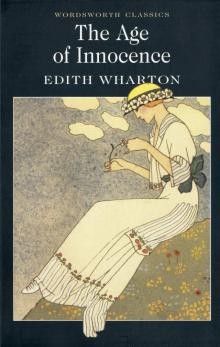 The Age of Innocence
The Age of Innocence The Reef
The Reef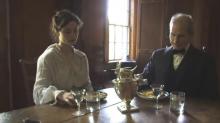 Summer
Summer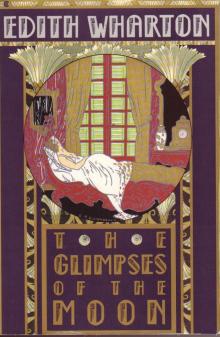 The Glimpses of the Moon
The Glimpses of the Moon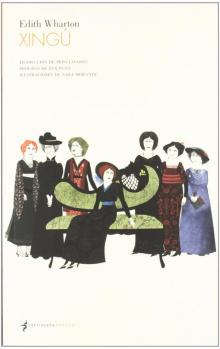 Xingu
Xingu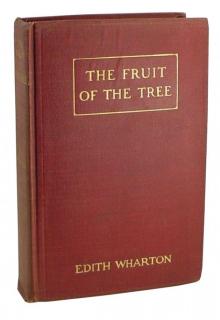 The Fruit of the Tree
The Fruit of the Tree Fast and Loose
Fast and Loose Artemis to Actaeon and Other Verse
Artemis to Actaeon and Other Verse The Line of Least Resistance
The Line of Least Resistance The Lamp of Psyche
The Lamp of Psyche The Reckoning
The Reckoning Afterward
Afterward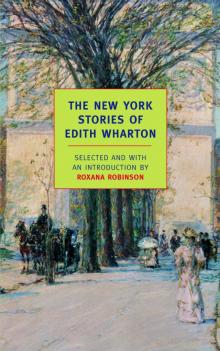 The New York Stories of Edith Wharton
The New York Stories of Edith Wharton The 2014 Halloween Horrors Megapack
The 2014 Halloween Horrors Megapack 'Copy': A Dialogue
'Copy': A Dialogue The Recovery
The Recovery The Fulness of Life
The Fulness of Life Early Short Stories Vol. 1
Early Short Stories Vol. 1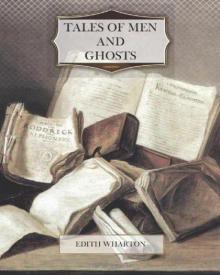 Tales of Men and Ghosts
Tales of Men and Ghosts The House of the Dead Hand
The House of the Dead Hand That Good May Come
That Good May Come The Buccaneers
The Buccaneers Other Times, Other Manners
Other Times, Other Manners The Hermit and the Wild Woman
The Hermit and the Wild Woman Kerfol
Kerfol The Duchess at Prayer
The Duchess at Prayer Bunner Sisters
Bunner Sisters The Choice
The Choice Madame De Treymes
Madame De Treymes Ethan Frome, Summer, Bunner Sisters
Ethan Frome, Summer, Bunner Sisters In Morocco
In Morocco The Valley of Decision
The Valley of Decision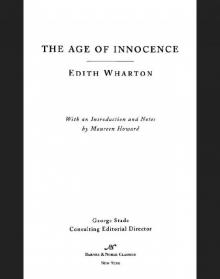 Age of Innocence (Barnes & Noble Classics Series)
Age of Innocence (Barnes & Noble Classics Series) The Angel at the Grave
The Angel at the Grave April Showers
April Showers Sanctuary
Sanctuary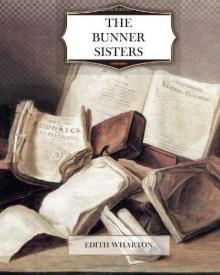 The Bunner Sisters
The Bunner Sisters Mrs. Manstey's View
Mrs. Manstey's View Writing a War Story
Writing a War Story The Custom of the Country
The Custom of the Country In Trust
In Trust The Triumph of the Night
The Triumph of the Night The Hermit and the Wild Woman, and Other Stories
The Hermit and the Wild Woman, and Other Stories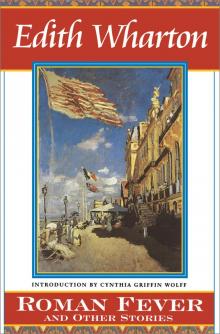 Roman Fever and Other Stories
Roman Fever and Other Stories The Mission of Jane
The Mission of Jane The Descent of Man and Other Stories
The Descent of Man and Other Stories Coming Home
Coming Home The Touchstone
The Touchstone Early Short Stories Vol. 2
Early Short Stories Vol. 2 Edith Wharton's Verse, 1879-1919, from various journals.
Edith Wharton's Verse, 1879-1919, from various journals.